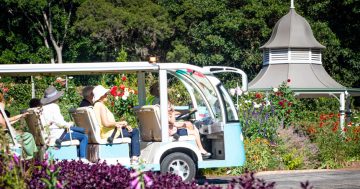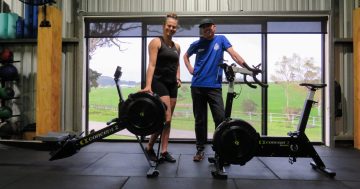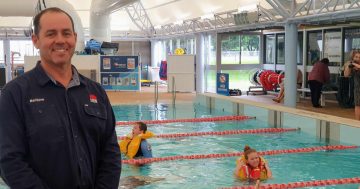
Jamberoo Aquaculture owner Alan Pemberton in front of one of his freshwater fishponds. Photo: Kellie O’Brien.
A black-and-white photo of the original farmhouse now hangs inside Alan and Carmel Pemberton’s Jamberoo home at Tabbagong – a farm that was established in the 1860s to breed shorthorn cattle and has transformed into a freshwater-fish farm.
An old dairy shed now houses tanks of blue claw yabbies, and surrounding dams have become fishponds for silver and golden perch fingerlings raised to help keep farmers’ dams clean.
That transformation was thanks to one of the previous owners tacking on the property, which had ties to a Kiama farm with the same name, and starting Jamberoo Aquaculture in the 1990s, which Alan and Carmel continued in 2009.
Not that either had any aquaculture experience, with Alan having worked in the coal industry for 30-odd years, while Carmel was a teacher.
“We had a property up at Kembla Grange, up under the mountain there, and we wanted something bigger and a bit flatter because it was pretty steep,” Alan said.
“We stumbled onto this.
“The fella who had it before us, he had an aquaculture licence too, but he wasn’t doing much. We bought the place and never bought any fish.”
Carmel said all the infrastructure was set up for them to continue it as a freshwater-fish farm, but while the previous owner focused on bigger fish, they decided on fingerlings.
“It was just buying a property and the fish stuff was here, so Al said, ‘Oh well, I’ll give it a go’,” she said.
Alan said it was also interest from farmers in the area that had been a catalyst for them jumping in the deep end.
“People wanted to know where they could get the fingerlings to put in their dams and I said to Carmel, ‘This could be a business here if we get fingerlings’ and we went from there,” he said.
With a little help from the previous owner and their supplier, they quickly began to learn the ropes.
A stunning location that’s been featured in TV shows such as Alive and Cooking and magazine spreads, it’s also now home to 20-odd beehives, with a “Honey for sale” sign at the end of the road, chooks that allow them to sell eggs, some cattle, and at one time they even bred Border Collies.
Since bringing on bees five years ago, most sales have come from visitors seeing the sign on their way to the nearby Jamberoo Action Park, a kilometre up the road.
“We’ve only got 25 acres (10 hectares], but we’ve got a fair bit happening on that 25 acres,” Alan said.
As Alan walks around the farm, his four dogs keep close to his heels as he points out that there are no silver perch fingerlings at the moment due to selling out last year and not having any to carry through winter.
“Last season we sold out. We normally get in anything from 30-60,000 fingerlings,” he said.
“We sold out and so we had nothing to carry through winter, and then we can’t get any more until January. Before, we used to start in September.”



When we reach the dairy, Alan picks up one of the yabbies for a photo opportunity.
“Any month with an ‘r’ in it is time for yabbies, but I’m actually leaving them until a bit closer to Christmas this year, just to let them build up their stocks a bit more,” he said.
“We’ve got six dams on our property, two of them we’ve got aquaculture licences to grow fish in. We’re supposed to call them fishponds, not dams.”
Alan said they bought from hatcheries in Wagga and Albury when silver and golden perch were just 3 cm long, with spawning expected to start soon so they were ready to take them on in January and finish the season in May.
He said his customers were mostly farmers who put them in their own dams.
“Silver perch are omnivores and they eat algae weed and insects, and they help keep the dams clean. That’s the main reason why farmers buy them,” he said.
“Some buy them so their grandkids or kids can fish them out, which you can then eat.
“Silver perch are indigenous to the Murray Darling. They can tolerate the heat in the summer and the cold in the winter and there was a lot of research done maybe 15 years ago to try and get aquaculture into freshwater farm dams.
“They did a fair bit of research on silver perch, not so much on golden perch. Golden perch are carnivores; you’ve got to feed them all live stuff, so we don’t sell many of them.”
Alan said it was a similar story with yabbies, with farmers stocking them in their dams so they could catch and eat them.
“We do sell some of our fish to people who grow things aquaponically in tanks,” he said.
“It used to be a big thing maybe six or eight years ago. We still get some aquaponics people, but not nearly as many as before.”
He said the reason for the demand spanning from Goulburn to Orange and Canberra was that others did not sell smaller quantities of fingerlings to farmers, but rather in bulk.
“We buy 30,000 at a time and people come to us because they might want 200 or 300 fish, where if they went to the hatchery, they don’t bother with them,” he said.
Alan said that while at one time they sold many larger fish to the Sydney Fish Market, they tended to focus on fingerlings now.
“The reason we’ve gone off the bigger fish now is because it takes us two years to grow them from one inch long to 14 inches long.”
While he admitted he was getting on at 69 years old, Alan said he would continue to sell fingerlings while he could handle it, admitting he was still “pretty fit and I enjoy it”.
Learn more about Jamberoo Aquaculture.












